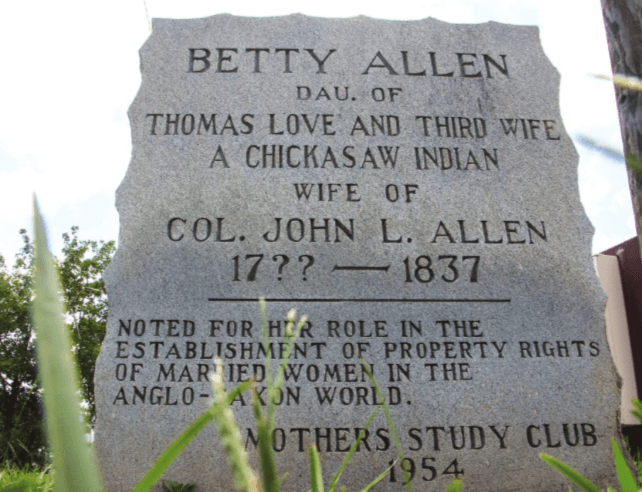Betsy Love Allen’s legal battle helped give married women across the land the right to own property

Thanks to a Chickasaw woman, Mississippi became the first state to decree that married women could own property in their own names and that it could not be seized to pay a husband’s debt.
Elizabeth (Betsy) Love was born in the late 1780s to former British trader Thomas Love and Sally Colbert, a Chickasaw tribal member. Betsy Love later married James Allen in a Chickasaw ceremony. They lived on the Love family’s Chickasaw land and operated a trading post on the Natchez Trace, according to Sandra Moncrief’s article for the Hancock County Historical Society.
All went well until March, 1831, when John Fisher, a lawyer who had once represented James Allen, sued him in Monroe County Circuit Court to recover an unpaid $200 legal fee. Fisher won a default judgment and sent the local sheriff to seize some of Allen’s property and auction it off to satisfy the debt. The sheriff seized an African-American slave named Toney, one of several slaves Betsy Love Allen owned before her marriage. She had deeded Toney to her infant daughter, Susan. A lawsuit was filed to void the seizure judgment.
The law across the land at that time said that when a couple married, the wife’s property became the property of the husband.
But the Allens were married under Chickasaw law on Chickasaw land before Mississippi extended its laws over Native American tribes in 1830. Chickasaw law protected a married woman’s property from debts incurred by her husband. At trial, a Monroe County jury ruled in favor of returning Toney to Susan. And in a landmark decision in January 1837, the Mississippi Supreme Court agreed. Susan got to keep her slave.
The court decision has been credited with helping prompt the Married Women’s Property Act of 1839, in which the Mississippi Legislature established the property rights of married women and protected them from creditors suing their husbands. Opponents argued, among other things, that the new law was a sham because it would give deadbeat husbands a way to shield their property from creditors.
But the new law quickly caught on across America. State after state passed similar legislation and women could breathe a sigh of relief.
Betsy Love Allen’s grave, moved from its original site years ago, sits on school property at Toccopola, just outside of Pontotoc.

THIRD ROW: Bill Rose, Chi Kalu, Slade Rand, Mitchell Dowden, Will Crockett. Not pictured: Tori Hosey PHOTO BY THOMAS GRANING
The Meek School faculty and students published “Unconquered and Unconquerable” online on August 19, 2016, to tell stories of the people and culture of the Chickasaw. The publication is the result of Bill Rose’s depth reporting class taught in the spring. Emily Bowen-Moore, Instructor of Media Design, designed the magazine.
“The reason we did this was because we discovered that many of them had no clue about the rich Indian history of Mississippi,” said Rose. “It was an eye-opening experience for the students. They found out a lot of stuff that Mississippians will be surprised about.”
Print copies are available October 2016.
For questions or comments, email us at hottytoddynews@gmail.com.
Follow HottyToddy.com on Instagram, Twitter and Snapchat @hottytoddynews. Like its Facebook page: If You Love Oxford and Ole Miss…
